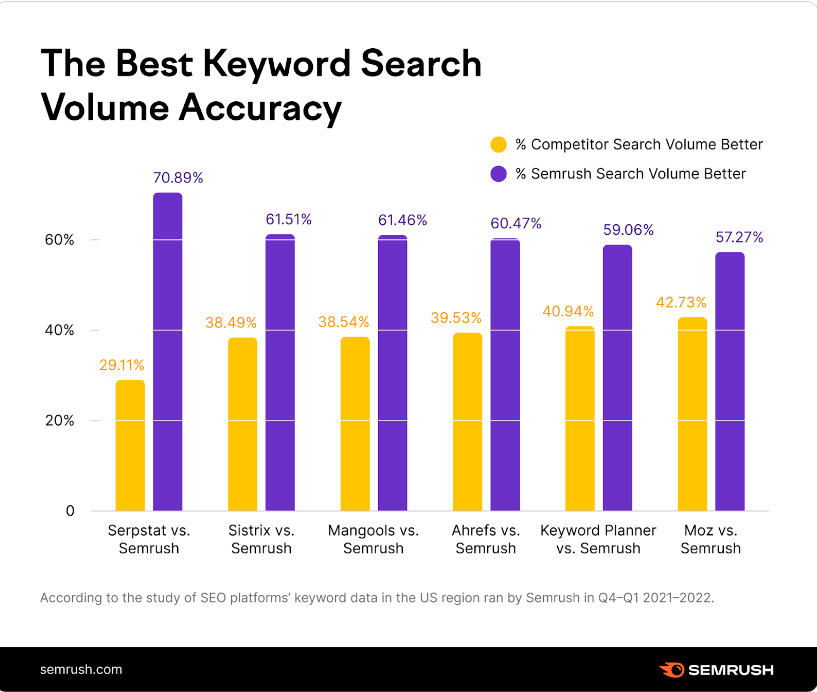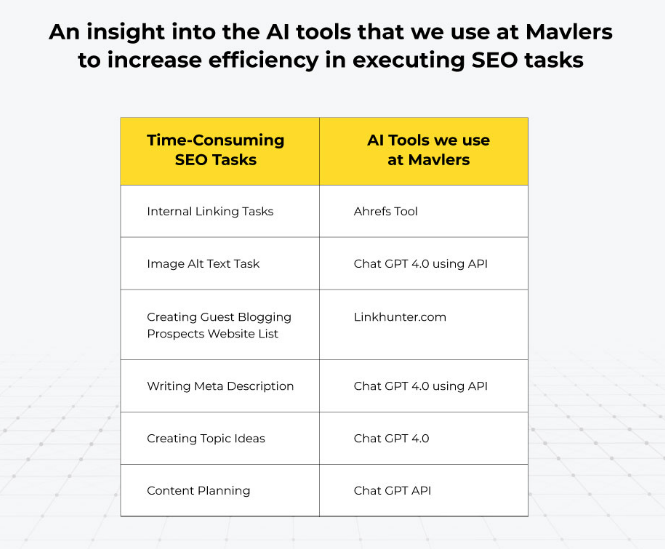So, you have decided to grow your brand organically through concerted search engine optimization efforts and carefully curated campaigns. But before you zero in on a particular offshore SEO partner, you want to be very sure about the tools they use to run and analyze successful SEO campaigns, along with their technical expertise.
At Mavlers, our SEO professionals have helped 7000+ global clients witness an increase in organic revenue by USD 196,000 over the past 12+ years.
This has not only made us quite familiar with client pain points and their solutions but also strengthened our commitment to offering a transparent and honest insight into the tools and tech stack we use to complement our manual SEO expertise so that our clients know what they are signing up for and what to expect!
In the blog that follows, we will be attempting to shed light on:
- Importance of using effective tools for successful SEO strategies
- Keyword Research Tools
- On-Page Optimization Tools
- Content Optimization
- Backlink Analysis
- Outreaching
- Analytics/Website Traffic Data Analysis
- Reporting
- Future Trends and Adaptability
Towards the end of this blog, we hope to familiarize you with the tools and tech expertise that Mavlers use to deliver the best results for your brand/agency’s SEO campaigns. We contacted our SEO experts, Samrat Solanki, Shashikant Mane, and Ishan Maniar, to bring forth their expertise and insights into the tools they use to assist in their SEO-related site endeavors.
Importance of using effective tools for successful SEO strategies
When asked about the importance of using the right tools for successfully analyzing and running an SEO campaign, Shashikant Mane candidly replied, “SEO tools for me are just a technical add-on to check for insights that the human eye might overlook, such as broken internal links, 404 errors, or other core technical website problems.”
Samrat Solanki makes a similar point, “So tools are basically software that help us identify site issues that we need to work on; however, since it is a non-sentient entity, we need to cross-check its findings so that we can pinpoint the exact issue and resolve the same. To sum up, tools can only complement an SEO expert’s endeavors and not entirely replace the need for a seasoned human eye to oversee, run, and analyze a successful SEO campaign.”
In summary, having the right SEO tools can make a difference in an SEO professional’s work. However, the campaign’s success will be a product of how well the SEO experts can identify, rectify, and optimize the site’s SEO issues and meet campaign needs to help the business achieve its organic growth objectives.
Let’s now delve into the tools and tech stack that we have at Mavlers to deliver successful SEO campaigns and analysis requirements.
Keyword Research Tools
At Mavlers, we use the best keyword research tools that are also pretty reliable, such as:
Google Keyword Planner:
The Keyword Planner is a free tool used at Mavlers to stay in sync with global industry metrics. It helps us search for keywords, find out how a list of keywords might perform, and even combine keyword lists to create new ones.
Here’s an insight into how we use Keyword Planner:
- Deploy the filtering option to refine the target audience and budget
- Choose quality keywords over a huge number of keywords
Semrush:
A study conducted in March 2022 showed that “Semrush’s search volume was the most accurate among top-known industry competitors.”

Source: Semrush
At Mavlers, we use Semrush to supplement the results of the Google keyword planner. It is a dynamic tool that offers more detailed metrics, such as keyword difficulty level, along with insight into keyword intention (such as commercial, transactional, navigational, and informational).
It helps us:
- Identify your strongest competitors in search
- Analyze the keyword profiles of your competitors
- Conduct a detailed analysis of your keyword profile
- Match keywords with relevant pages of your website
- Conduct a review of optimization ideas
- Use Position Tracking to see how our efforts translate into ranking changes
Ahrefs:
Ahrefs offers a similar level of detail as Semrush and is used to a limited extent at Mavlers.
Ahrefs Webmaster Tool is used to decipher the keywords your website ranks for, along with an insight into their Keyword Difficulty scores.
We also use Keywords Explorer to perform expert-level keyword research and discover appealing keyword ideas.
On-Page Optimization Tools
Though on-page optimization is a majorly manual process, we also use the following tools to complement the process.
Semrush:
Semrush’s On-Page SEO checker allows us to craft a detailed and structured list of tasks that we can do to improve the rankings of your website pages.
It helps us accomplish the following on-page optimization tasks seamlessly:
- Come up with on-page SEO ideas
- Semantically related keywords that can be strategically used on your web pages
- Target content length & readability
- Identify backlink prospects
- Spot low-hanging fruit when importing data from sources like Google Search Console, Google Analytics, Organic Research, Position Tracking, Excel file
- Deploy precise optimization ideas based on the top 10 real-time competitors for each target keyword.
Screaming Frog:
So, Screaming Frog is a desktop program we use at Mavlers to crawl client websites and collect relevant data about them.
Available for both Mac and Windows, we use it to:
- Find broken links, orphan pages
- Locate duplicate content
- Identify missing title tags
- Generate XML Sitemaps
- Carry out auto redirects
- Crawl JavaScript websites
- Visualize and implement SEO-friendly site architecture
- Analyse page titles and metadata
- Compare crawls and staging
- Extract data from the HTML of a website through CSS and XPath
- Connect With Google Analytics, Google Search Console, and PageSpeed Insights
Ahrefs:
We use Ahrefs for on-page optimization in the following ways:
- Ahrefs’ Keywords Explorer helps us identify Content Gap, which allows us to optimize pre-existing pages by adding the missing sub-topics
- Content Report generated with Ahrefs’ Site Audit allows us to find pages with missing or empty H1 tags
- Identify pages with title tag issues like being empty or too long
- Use the Internal Link Opportunities tool to create relevant internal links
Content Optimization
We use the following tools and processes for detailed website content analysis and optimization.
Grammarly
We use the premium version of Grammarly to carry out extensive grammar checks on the website content because first impressions are often the last, and bad grammar or typographical errors are quite a big turn-off in the digital age!
Chat GPT & Jasper.ai
We use Chat GPT and Jasper.ai to carry out relevant content optimization research.
Chat GPT helps us come up with relevant content ideas. It also helps optimize existing content for better visibility on search engines by suggesting relevant keywords and insights into how prospects might search for your content.
Jasper.ai helps with:
- Content refreshing
- Creating content briefs
- Writing FAQs for landing pages or blogs
- Generating quick summaries of articles based on URL
Semrush Keyword Gap
Semrush’s Keyword Gap tool allows us to compare keyword profiles of up to five of your competitors.
We enter the domains and choose the types of keyword rankings (organic, paid, or Product Listing Ads keywords) we wish to analyze.
It helps us optimize and plan SEO campaigns in the following ways;
- Come up with an instant SEO competitive analysis between you and your top five competitors
- Identify the unique keywords your competitor is ranking for that you are not currently
- Conduct Organic, Paid, and PLA (Google Shopping) analysis
- Create visual charts of keyword overlap between sites
- Compare mobile as well as desktop keywords
- Compare subdomains, subfolders, and URLs
- Deploy advanced filters for quick and efficient keyword research (Position, Keyword Density %, Intent)
Google Search Console (GSC) performance reports for identifying low-hanging keywords
We identify the low-hanging keywords by analyzing the position data in your GSC performance report. We look for the ones ranking on the second or third page of search results (positions 11-30) with relatively high search volume.
These are the ones that have great potential and can help your website rank with some optimization.
Our manual efforts
Once we are done identifying the keyword gaps and the low-hanging ones, we roll up our sleeves and get down to the grind! Based on keyword research, we manually conduct a content gap analysis of landing pages.
- We access and understand keyword intent and relevance
- Filter and prioritize low-hanging keywords
- Sort the keywords by potential traffic and competition
- Consider targeting long-tail keywords for more refined search queries
- Improve on-page SEO elements
- Optimize and incorporate low-hanging keywords organically into your content without indulging in keyword stuffing!
Backlink Analysis
A thorough backlink audit helps us analyze the quality, quantity, and relevance of links to your website. For conducting backlink analysis, we use the following tools;
Ahrefs:
After setting up a Project in the Ahrefs Webmaster Tool, we click on Backlinks in the dashboard. This shows us all the backlinks and relevant backlink data in the report generated by the Site Explorer tool.
For checking backlinks to another website, we use Ahref’s free Backlink Checker, wherein we enter the URL or domain and hit “Check backlinks.”
This shows us the total number of backlinks to the website and referring domains (links from unique websites), plus the top 100 backlinks.
Semrush:
To begin the analysis, we use the Backlink Analytics tool. We enter the domain name and click on “Analyze.”
We then proceed toward the “Overview” tab, enter some of your competitors’ domains, and click “Compare.”
Here, we review the backlinks, referring domains, and referring IPs, authority scores, link attributes (follow and nofollow.)
We then use Semrush’s Backlink Audit tool to analyze the quality of your backlinks. We look for the following parameters: overall toxicity score and authority score of the lining domains.
To recover your lost backlinks, we use the Link Building tool, wherein we first configure the tool, go to the “Prospects” tab and click on “Lost Backlinks.”
After opening each lost backlink individually, we will know the reason behind their disappearance, like 404 errors or the owner taking down the link, and then take requisite measures to win back that link!
Google Search Console (GSC) Link Domain Feature:
Though the GSC is not as feature-rich as some other tools, it shows us exactly what Google sees when crawling your website and is free to use!
It offers a link report with insights on the following parameters,
- the most linked-to pages on your site
- the anchor text linking sites use
- the sites that link to yours the most
- the number of backlinks from each site on each page
- the exact sites linking to those pages
Outreaching
To carry out the outreach process to get backlinks, we adopt a two-pronged approach – either manually or set up an automated process using PitchBox.
Manual outreach process:
Here, we follow a three-step process wherein, firstly, we use SemRush and Ahrefs to find relevant prospects for outreach purposes.
Then, we use the Hunter.io extension for contact sourcing, that is, finding the contacts’ email addresses discovered through Semrush and Ahrefs.
Once we have the email IDs of the identified, relevant outreach prospects, we use Gmail to send them backlink requests.
Automated outreach process using PitchBox:
PitchBox allows us to scale our link-building and outreach efforts using automated workflows. It uses simple “When/Then” dynamics to set up automated link-building and follow-up processes.
We use this one-stop platform for all the three steps involved in building quality links;
- Identify relevant prospects
- Find out the email address of their point of contact
- Set up automated email sequencing to get more responses and close more deals
Analytics/Website Traffic Data Analysis
For executing website traffic data analysis, we use the following tools;
Google Analytics:
We use the data gathered from Google Analytics to gain clarity on;
- where the visitors are coming from
- what they do on your site
Google Search Console:
GSC’s tools and reports allow us to measure your site’s search traffic and performance, rectify issues, and improve your site’s SERP (Search engine page) rankings.
Clarity (For CRO purposes):
For Conversion Rate Optimization endeavors, Microsoft Clarity helps us on the following accounts;
- Live Recording of User Sessions with your Website
- Total Clicks in a Session
- Accurate Heatmaps
- Bounce Rate
- Dead Clicks
- Rage Clicks
- Demographic Data
Hotjar (For CRO purposes):
Hotjar is another tool that we use for Conversion Rate Optimization activities.
Hotjar heatmaps allow us to gain clarity on what users do on your website pages and thereby eliminate friction wherever there are marked instances of areas that they ignore or face trouble with.
Hotjar recordings, on the other hand, allow us to gain the full picture of how visitors interact with your website in real-time.
Reporting
For reporting purposes, we use the following tools;
- SuperMetrics for automatically extricating cross-channel SEO data from Google Sheets, Semrush, and Ahrefs.
- Looker Studio by Google presents data imported from Excel databases, Google Sheets, etc. Originally known as Google Data Studio, it helps transform SEO data into reports and dashboards. Offered by Google, it is free to use!
An Insight into Future Trends and Adaptability
At Mavlers, we are committed to becoming an AI-first organization that is focused on optimizing error-free productivity to ensure client satisfaction. The following table sheds light on certain time-consuming SEO tasks that we have now supplemented with AI tools to save time and increase efficiency.

So, what’s next?
Now that you are familiar with the tools and tech stack we use at Mavlers to run and analyze SEO campaigns, you might also want to look at our expertise and tech stack in other digital marketing arenas.


Hello! I’ve been reading your blog for a while now and finally got the bravery to go ahead and give you a shout out from Huffman Texas! Just wanted to mention keep up the good work!